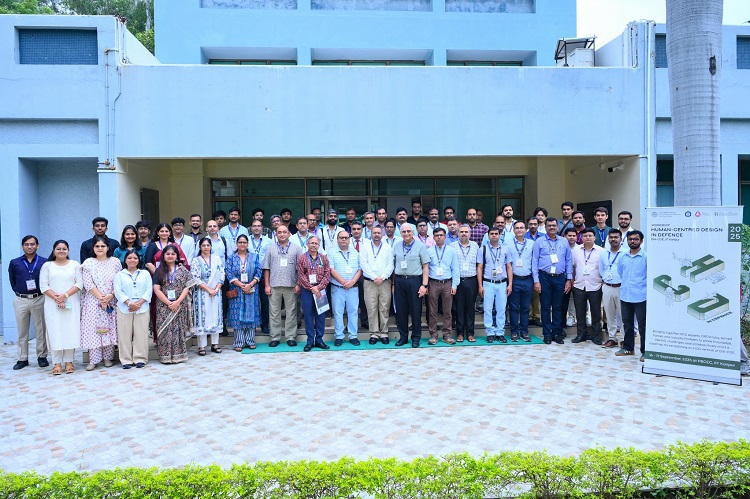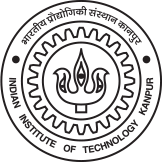
IIT Kanpur Hosts Workshop on Human-Centred Design for Defence Applications
- Fostering Synergy Between DRDO, Industry, and Academia to Build Soldier-Centric Technologies
Kanpur , 17 September 2025
Source: Information and Media Outreach Cell, IIT Kanpur
The Indian Institute of Technology (IIT) Kanpur recently hosted a pivotal workshop focused on Human-Centred Design (HCD) in Defence Applications, bringing together leading figures from academia, the defence sector, and industry. The event, organised under the umbrella of the Defence Innovation Accelerator for Systems and Technologies –Centre of Excellence (DIA–COE), aimed to spotlight a crucial yet often overlooked dimension in defence research and development: designing with the end user—the Indian soldier—in mind.
As India continues its journey toward self-reliance in defence through the Atmanirbhar Bharat initiative, the insights and frameworks from this workshop will play a critical role in ensuring that our innovations are not only cutting-edge but also deeply human.
The workshop commenced with the ceremonial lamp lighting by Shri L.C. Mangal, DS & DGTM, DRDO, who was also one of the keynote speakers, Shri Sanjay Tandon, Director of DIA–COE at IIT Kanpur, Prof. Tarun Gupta, Dean of Research and Development, IIT Kanpur, Prof. Satyaki Roy, Head of the Department of Design, IIT Kanpur and Assoc. Prof. Vivek Kant, Department of Design, IIT Kanpur.
Following the inauguration, the welcome address was delivered by Shri Sanjay Tandon, Director of DIA–COE at IIT Kanpur. He underscored the ethical and strategic importance of adopting Human-Centred Design (HCD) in defence innovation. In his words, “Human-Centred Design is not just a design philosophy—it is a responsibility. In our pursuit of cutting-edge defence technologies, we must ensure they remain humane, usable, and meaningful for those who rely on them in the most extreme conditions. A technology that is not accepted by its users, no matter how advanced, is a failed innovation.”
Shri L.C. Mangal, DS and DGTM, DRDO, during his keynote address, provided an in-depth perspective on the gap between technological sophistication and usability in defence systems. He made a powerful case for repositioning Human-Centred Design from a peripheral concern to a core pillar in the defence product development cycle. “Technology excellence alone is not enough—true innovation lies in designing products where the end user, especially our soldiers, is at the centre,” he said. “Human-Centred Design must move from being an afterthought to a foundational element in defence product development, ensuring usability, reliability, and contextual relevance from day one.”
He emphasised that a soldier’s stress and cognitive load during combat situations must inform every design decision, from interface layout to sensory feedback systems. He discussed emerging technologies such as context-aware user interfaces, cognitive radio, and brain-computer interfaces that could transform the way soldiers interact with their equipment. Additionally, he advocated for the integration of psychological and physiological parameters into system design, suggesting that future technologies must adapt automatically to the user’s state rather than forcing the user to adapt to the machine. He proposed the establishment of a dedicated vertical on Human-Centred Design within DRDO’s Centres of Excellence and pledged full support for any infrastructure or research facilities needed by IIT Kanpur to advance this critical domain.
Professor Tarun Gupta, Dean of Research and Development at IIT Kanpur, stressed the necessity of translating research into real-world utility. He noted, “Human-Centred Design begins with empathy. If we truly want to support our soldiers operating in extreme and stressful environments, our technologies must move beyond research prototypes and become intuitive, resilient, and usable in the real world. Understanding the user is not optional—it is essential.”
Further strengthening the narrative, Professor Satyaki Roy, Head of the Department of Design at IIT Kanpur, emphasised the foundational role of empathy in the design process. He remarked, “Human-Centred Design is not just about technology—it’s about empathy. Unless we truly understand and design for the people using the system, even the most advanced innovation can fail. At IIT Kanpur, we are committed to supporting this approach by nurturing interdisciplinary design education and research that puts the user first.”
Vivek Kant, Assoc. Professor in the Department of Design and the conceptual lead of the workshop, presented the structure and broader vision of the event. He articulated the workshop’s purpose as identifying current challenges and research gaps in human-centred defence design, formulating a strategic roadmap, and building synergy among academia, defence agencies, and industry stakeholders. The sessions aimed to align technological advancements with real-world requirements, ensuring that user needs and operational contexts are central to innovation.
An engaging session was delivered by Wing Commander Siddharth Singh, a retired Indian Air Force fighter pilot and expert from the National Flight Testing Centre. Drawing from his extensive experience of over 3,000 flying hours, he offered deep insights into cockpit design challenges, illustrating how critical HCD is in ensuring safety, efficiency, and mental clarity in high-pressure combat environments. His presentation offered a rare window into the real-world application of design principles in life-and-death scenarios.
Design experts enriched the event with their keynote contributions. Professor Sugandh Malhotra from the IDC School of Design at IIT Bombay, Mr. Nabarun Bhowmick, a seasoned product designer with extensive experience in physical and digital design, Professor Abhishek Shrivastav, IIT Guwahati and Chair of the HCI Professionals Association of India Steering Committee, and Professor Sanjram Premjit Khanganba from IIT Indore each provided unique insights into the role of usability, interaction design, and human factors in the defence innovation pipeline.
The workshop also featured a dynamic interactive session on Team Brainstorming and Challenge Mapping. This session encouraged cross-disciplinary teams to collaboratively identify pain points faced by soldiers, map out user challenges, and propose preliminary solution frameworks that would feed into the upcoming white paper.
As the workshop concluded, Vivek Kant shared the initial structure of the forthcoming white paper, which will consolidate the key insights, research directions, and recommendations arising from the event. The document is expected to serve as a strategic guide for future research and development in this area, while also informing national policy and procurement guidelines.
The event reaffirmed IIT Kanpur’s leadership in fostering innovation that is not just technologically superior but ethically and practically grounded in human experience. Through the support of DIA–COE and partnerships with DRDO and industry, the institute is actively shaping a future where India’s defence technologies are built not only for power, but for people.
About IIT Kanpur
The Indian Institute of Technology Kanpur, established in 1959, holds the distinction of being recognised as an Institute of National Importance by the Government of India through an Act of Parliament. Renowned for its excellence in science and engineering education, IIT Kanpur has made significant contributions to research and development over the decades. Its expansive, lush green campus spans 1,050 acres and hosts a rich array of academic and research resources. The institute comprises 19 departments, 26 centres, three interdisciplinary programs, and two specialised schools across engineering, science, design, humanities, and management disciplines. With over 590 full-time faculty members and more than 9,500 students, IIT Kanpur continues to be a leader in fostering innovation and academic rigour.
For more information, please visit www.iitk.ac.in.




